Expect monthly living costs around €1,835 as a single in Lisbon (rent excluded ≈ €745); rent for a one‑bed in the centre averages €1,408 and ≈€1,090 outside. Groceries typically run €150–€250 for one person, utilities for an 85 m² flat ≈€125–€130, and unlimited fiber internet €33–€37. Public transport monthly pass ≈€40. Lisbon’s pricier than other Portuguese cities but cheaper than London; keep reading for neighbourhood, rental and savings strategies.
Is Lisbon Expensive Compared With the Rest of Portugal and Europe?
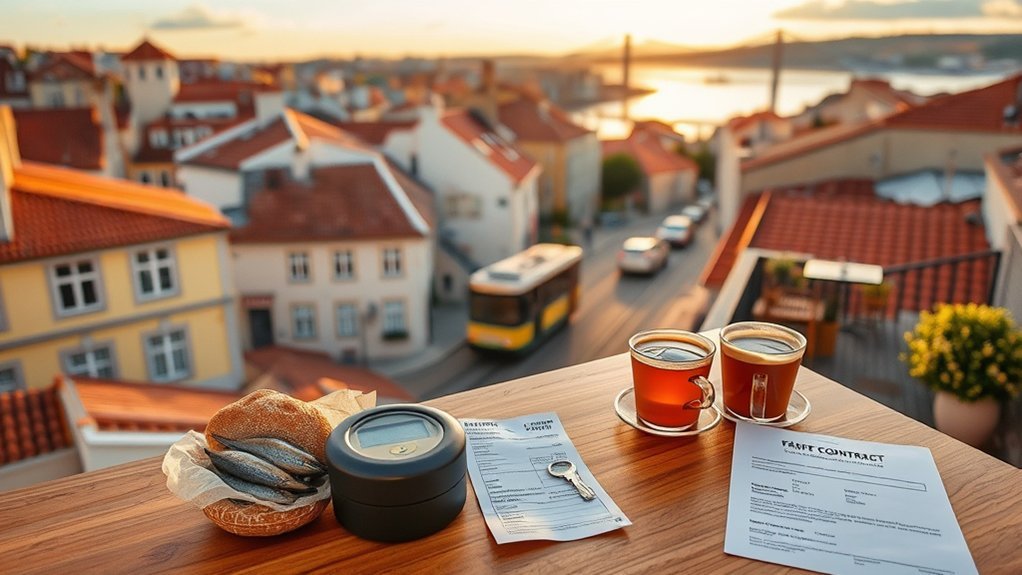
Lisbon stands out as Portugal’s most expensive city: total monthly costs for a single person average about €1,835 (excluding rent roughly €745), roughly 17% higher than Porto, driven largely by high rents — a one‑bed in the city centre averages €1,408 versus €1,090 outside the centre.
You’ll find Lisbon cost of living higher than most Portuguese cities due mainly to city centre rent and housing affordability pressures.
In a Portugal rental market context, monthly expenses for groceries utilities add meaningful overhead but remain below many Western capitals.
In a Lisbon vs Europe cost comparison, Lisbon is roughly 55% cheaper than London and about 23% cheaper than Berlin for a single person, so you gain comparative value despite steep local rent prices.
You should weigh Portugal rental market dynamics and recent policies targeting tourist rentals; 2025 shows stabilizing rent growth and better value in suburbs and commuter towns, shifting affordability trade‑offs away from the centre. Additionally, understanding construction costs in various regions can provide insights into housing affordability challenges.
Typical Rent Prices by Apartment Size and Neighbourhood
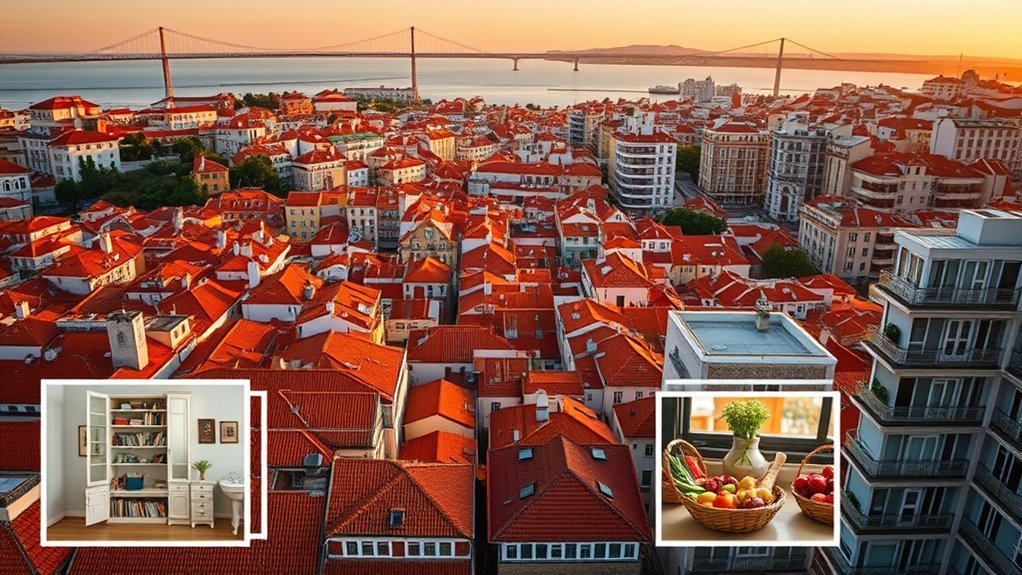
You’ll pay about €1,400–€1,450 for a 1‑bedroom in the city centre versus ≈€1,090–€1,100 outside it, and roughly €2,600–€2,630 for a 3‑bedroom in-centre compared with ≈€1,710 outside.
Neighbourhoods on the Lisbon–Cascais line and outer districts like Marvila, Beato, Montijo and Alcochete typically offer lower rents with ~30‑minute commutes. Note most long-term lets are unfurnished, leases run 12 months minimum, and you’ll need a NIF plus ID and income proof to rent. Additionally, understanding startup costs for housing can help you better navigate the rental market.
Average Rent by Size
Although prices vary by neighbourhood and size, expect roughly €1,100–€1,900 for a 1‑bed in the city centre (Numbeo average ~€1,408) and about €800–€1,300 outside centre (average ~€1,090).
For average rent by size, a 3‑bedroom rent averages ~€2,630/month in the centre and ~€1,710 outside.
You’ll see clear rental price ranges: 1‑bedroom rent and 3‑bedroom rent differ by roughly €1,000–€1,300 between centre and periphery.
Lisbon rent trends show furnished vs unfurnished differences: furnished units dominate short‑term or student markets, while long‑term leases are often unfurnished with 12‑month minimums.
To lower monthly housing costs consider suburbs and commutes — Cascais line or outer districts offer noticeably cheaper alternatives with reasonable commutes.
Neighbourhood Price Differences
After looking at average rents by size, it helps to compare neighbourhoods: central areas like Chiado, Príncipe Real and Alfama push one‑bed prices toward the €1,400–€1,500 range and three‑beds to about €2,600+, while outer districts or suburbs such as Marvila, Beato, Montijo and Alcochete typically sit nearer the €1,090 one‑bed and €1,700 three‑bed marks.
You’ll see clear Lisbon rent splits: a one-bedroom central average ~€1,408 versus ~€1,090 outside; a three-bedroom centre ~€2,630 versus ~€1,710 outside.
Neighbourhoods expats prefer command premiums; housing price differences matter if you value commute or space.
Consider Lisbon–Cascais train suburbs for value and 30‑minute access.
Expect short-term furnished options near universities/tourist zones, but long-term unfurnished leases commonly require 12 months.
How to Find and Rent an Apartment in Lisbon

Start by scoping the market: Lisbon’s long‑term rentals are mostly unfurnished with typical 12‑month leases (auto‑renewed), and average rents hover around €1,408/month for a 1‑bed in the centre versus ~€1,090 outside — higher in prime neighbourhoods.
To search efficiently, use rental sites Idealista, OLX, Imovirtual and Casa Sapo and filter for unfurnished rentals to compare true rent in Lisbon across Lisbon neighbourhoods.
Target value areas along the Cascais train line or outer districts for lower 1-bedroom rent and ~30‑minute commutes.
Prepare documentation: Portuguese NIF, ID and proof of income (bank statements, contract or tax return); landlords commonly request a Portuguese bank account for direct debits and deposits.
Avoid tourist-heavy zones (Chiado, Alfama, Príncipe Real, Mouraria) if you want a stable long‑term flat.
Negotiate lease terms, confirm automatic renewal clauses on the 12-month lease and inspect wiring, water and building access to reduce surprises after moving in. Additionally, consider your budget for ongoing maintenance and utility costs associated with the apartment to ensure financial stability during your stay.
Monthly Utilities, Internet and Mobile Costs
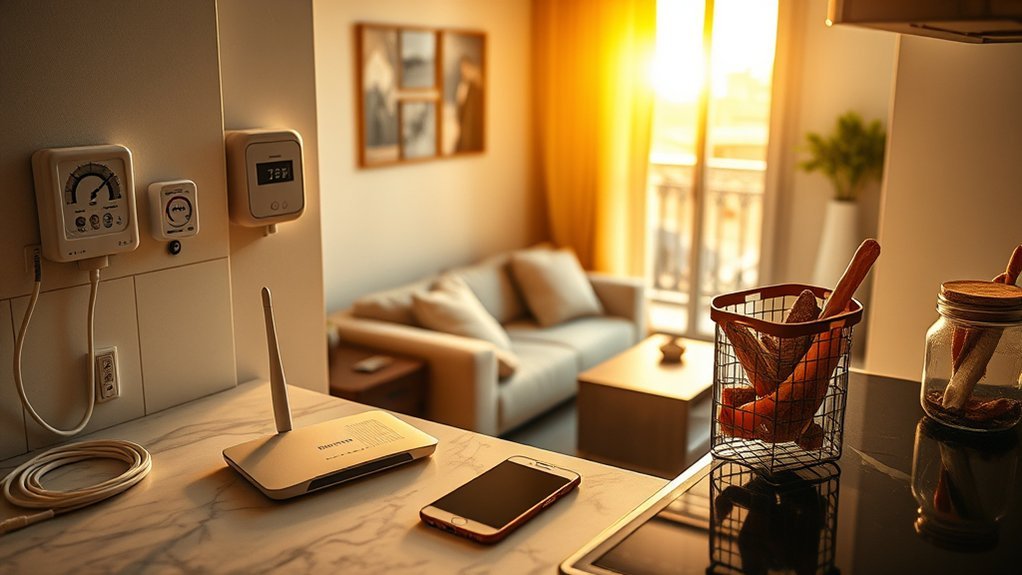
For an 85 m² apartment expect basic utilities (electricity, heating/cooling, water, garbage) of about €125–€130 per month, plus unlimited home internet at roughly €33–€37. Mobile plans with 10+ GB from MEO, Vodafone or NOS run €17–€20, while low-cost carriers or eSIM options can cut that to €8 or add an eSIM for ~€3.50; comparing providers on sites like Comparaja or PoupaEnergia and upgrading appliances can lower those bills. It’s also important to consider that regular maintenance can help prevent exhaust leaks and potentially reduce related costs in the long run.
Typical Monthly Utilities
While Lisbon’s rent usually grabs the headlines, your monthly utilities — electricity, heating/cooling, water and garbage — typically add about €125–€130 for an 85 m² apartment.
That baseline lets you compare: electricity bill and water bill form the bulk, with gas bill smaller unless you use gas heating.
Internet cost and mobile plan are separate — see next section — but factor them into total living cost.
Older, unfurnished rentals often have inefficient appliances, so replacing them or adding flow reducers yields measurable utility savings.
Use comparison sites like Comparaja or PoupaEnergia to shop energy tariffs and lower electricity/gas contract costs.
Internet and Mobile Plans
After you’ve budgeted utilities, add internet and mobile costs — they’re predictable and often cheaper than in many Western European capitals. Unlimited home internet (60+ Mbps via fiber or cable) runs about €33–€37 monthly cost. Mobile plans with 10+ GB and calls start €17–€20 at MEO, Vodafone, NOS; low‑cost carriers like Lycamobile begin near €8. eSIMs are widely available (activation ≈ €3.50) if your phone supports them. Bundles combining internet and mobile lower total bills; use comparison sites to compare offers. Contract plans usually require a Portuguese NIF and less flexibility, while prepaid/data plan options suit short stays.
- Choose fiber/cable for stable speeds and predictable monthly cost.
- Consider eSIM or prepaid for short-term flexibility.
- Bundle to reduce combined bills.
Grocery Prices and Typical Food Budgets
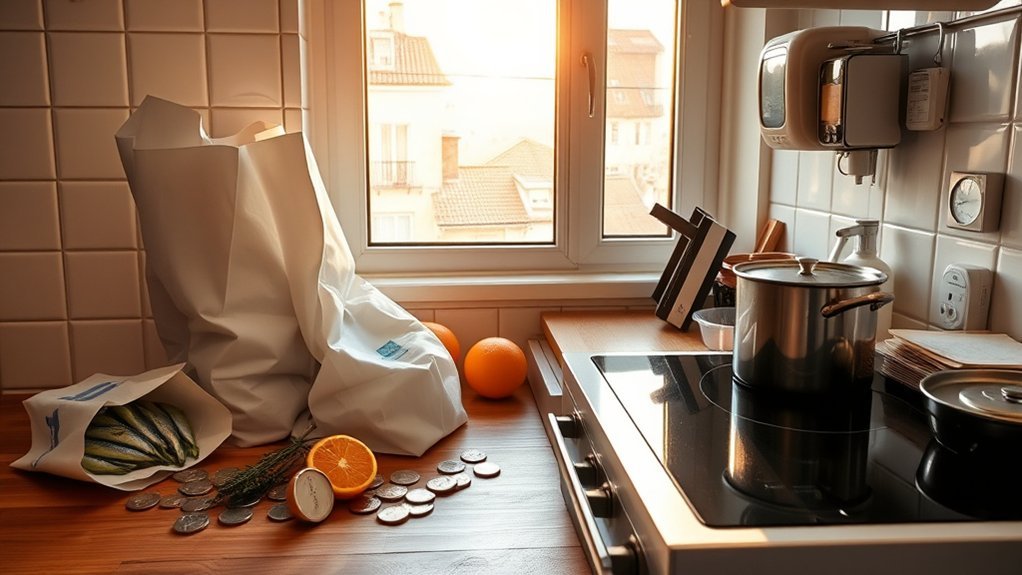
You’ll typically spend about €150–€250 a month on groceries if you’re single in Lisbon, €300–€400 as a couple, and roughly €600–€700 for a family of four; those ranges assume you shop smart and cook at home. You’ll compare supermarket prices across Pingo Doce, Continente, Mercadona and discount chains like Lidl to hit your monthly food budget. Single person groceries often stay low by buying rice (€1.49–€1.51/kg), bread (€1.48–€1.59/500g) and milk (€0.96–€0.99/L). Meat prices (chicken €6.80–€6.98/kg, beef €13.69/kg) and fruit and vegetables (apples €1.20–€1.98/kg) push costs higher for families. Local markets offer better quality and lower prices for produce, reducing family grocery costs if you shop there and cook. Regular preventative maintenance can also help keep your grocery budget in check by minimizing food waste.
| Item | Typical price (€) |
|---|---|
| Milk (1L) | 0.96–0.99 |
| Bread (500g) | 1.48–1.59 |
| Rice (1kg) | 1.49–1.51 |
| Eggs (12) | 2.70–3.04 |
| Chicken (kg) | 6.80–6.98 |
Childcare, Schools and Family-Related Expenses

Because childcare in Lisbon mixes private provision with growing public support, your costs will vary widely depending on age, residency and service type. Nursery availability for 0–3s is mainly private, so childcare costs can be substantial unless you access childcare subsidies or family allowance; the government is gradually expanding free provision for under‑3s.
For ages 3–6, preschool/kindergarten often has public school (free) options, but access may require residency or permits for non‑EU families. International school fees run roughly €7,500–€20,000+ per year, while public schools are tuition‑free but taught in Portuguese, so costs depend on language needs and curriculum preferences. Many families mix private nursery, babysitter/au pair, and daycare to balance schedules and budgets. Early childhood education quality is variable, so compare settings by ratios and curriculum. Expect lower net outlays if you qualify for family allowance or local childcare subsidies; otherwise plan for significant private spending, especially for international school fees. Additionally, understanding the scope of services offered by different childcare providers can help families make informed decisions about their financial commitments.
- Compare public vs private slots and eligibility.
- Factor subsidies and family allowance into budgets.
- Mix babysitter/au pair with nursery to reduce costs.
Transportation, Gyms and Leisure Costs

In Lisbon, getting around is affordable and predictable: a monthly public-transport pass runs about €40 (single fares €1.50–€2) via the rechargeable Lisboa Viva card, and occasional taxi or Uber trips remain cheaper than in most Western capitals.
Lisbon’s transport is affordable and reliable—monthly passes around €40, single fares €1.50–€2, taxis/Ubers reasonably priced.
You’ll find one-way fare Lisboa Viva tickets typically €1.50–€2 across metro tram bus fares and suburban trains, so monthly transit cost Lisbon for regular commuters stays low versus other European cities.
Taxi Uber Lisbon options fill gaps for late nights or heavy luggage without large premium.
Gym membership Lisbon spans budget to premium: Gym Solinca VivaGym plans cost roughly €12–€40/month, while Holmes Place membership runs €90–€150/month, so compare facilities against price.
Leisure entertainment costs average around €150/month for many residents; Lisbon cinema restaurant prices are modest—film tickets €6–€10 and mid-range meals €12–€25 per person.
Seasonal outdoor activities (surfing, hiking, beaches) add low-cost active options that further reduce overall leisure spending. Additionally, the cost-effectiveness of owning a portable jump starter like the NOCO GB40 can provide peace of mind for commuters and travelers who rely on their vehicles frequently.
Practical Tips to Lower Living Costs in Lisbon
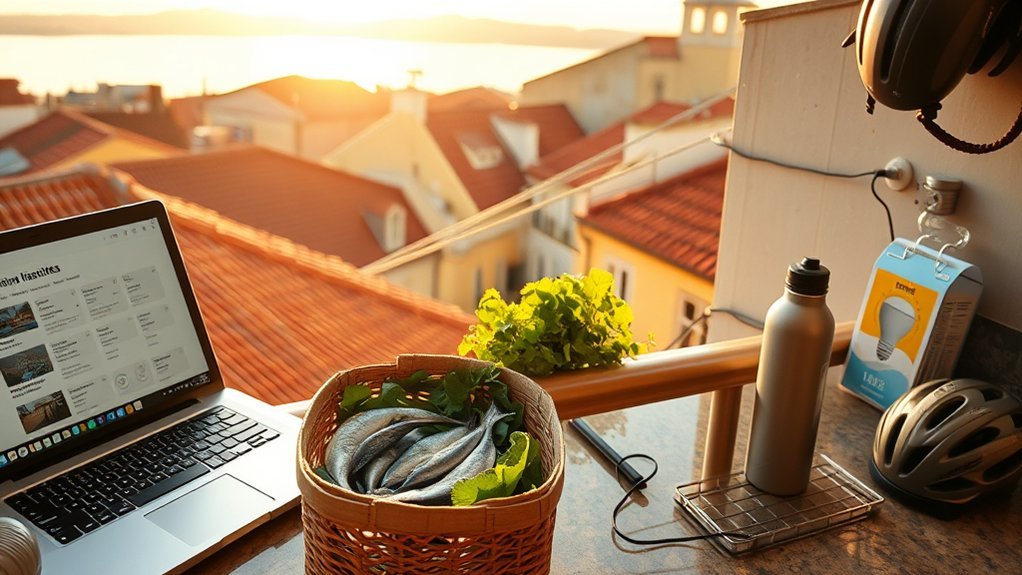
Start by targeting the biggest drain — rent — and you can shave several hundred euros a month: a one‑bed in central Lisbon averages about €1,408 vs roughly €1,090 outside the centre or along the Cascais train line (30‑minute commute), so prioritize neighborhoods with good commuter links, opt for unfurnished 12‑month rentals when possible, and have your NIF and proof of income ready to speed applications via Idealista, OLX, Imovirtual or Casa Sapo.
Next, cut monthly grocery costs (€150–250) by using discount supermarkets (Lidl Aldi), local markets and meal planning; staples cost: milk €0.96/L, bread €1.48/500g, rice €1.49/kg, chicken €6.80/kg.
Trim utility bills (€126/month average for 85 m²) by replacing inefficient appliances, installing flow reducers and comparing energy plans on Comparaja or PoupaEnergia.
Finally, choose budget mobile & internet options — Lycamobile €8,20,37 or basic unlimited broadband ~€37 — and list flats on rental search sites to secure Lisbon rent savings fast. Additionally, consider that monthly utilities can significantly impact your overall living costs, so budgeting for them is essential.
- Prioritize commuting Cascais line suburbs
- Choose unfurnished rentals, have NIF and documentation
- Use discount supermarkets and compare energy plans
Frequently Asked Questions
How Much Do You Need to Live Comfortably in Lisbon?
You’ll need roughly €1,500–€1,800/month to live comfortably in Lisbon; consider neighborhood choice, transport options, health insurance, entertainment budget, co working spaces, seasonal expenses, language classes, savings strategy, emergency fund, and side hustles.
How Much Is the Average Rent in Lisbon?
You’ll pay about €1,090–€1,408 for a typical 1‑bedroom; studio apartments and furnished options vary, short term rentals cost more, shared housing lowers prices, watch rental scams, know tenant rights and lease negotiations, consider commuting distances.
How Much Do Groceries Cost per Month in Portugal?
You’ll spend about €150–€250 monthly solo, €300–€400 as a couple, €600–€700 for four; use local markets, farmers’ markets, seasonal produce, supermarket brands, bulk buying, meal prepping, store loyalty to offset food inflation and organic prices.
Can You Live on $2000 a Month in Portugal?
Yes — you can live on $2,000/month in Portugal if you budget: prioritize outside‑centre rent, use public transport, shop local markets, balance nightlife costs and leisure activities, factor visa requirements, healthcare access, seasonal budgeting, co‑working spaces, language learning, remote work.
Conclusion
Lisbon’s costs sit midrange: pricier than other Portuguese cities but cheaper than many Western European capitals. Rent dominates your budget, but groceries, utilities, transit and leisure remain moderate — and childcare can spike costs if you’re a parent. If you think it’s unaffordable, note you can cut housing by choosing outskirts or flatshares and lower daily expenses with markets and public transport. Overall, you’ll get strong value for living standards versus cost.


